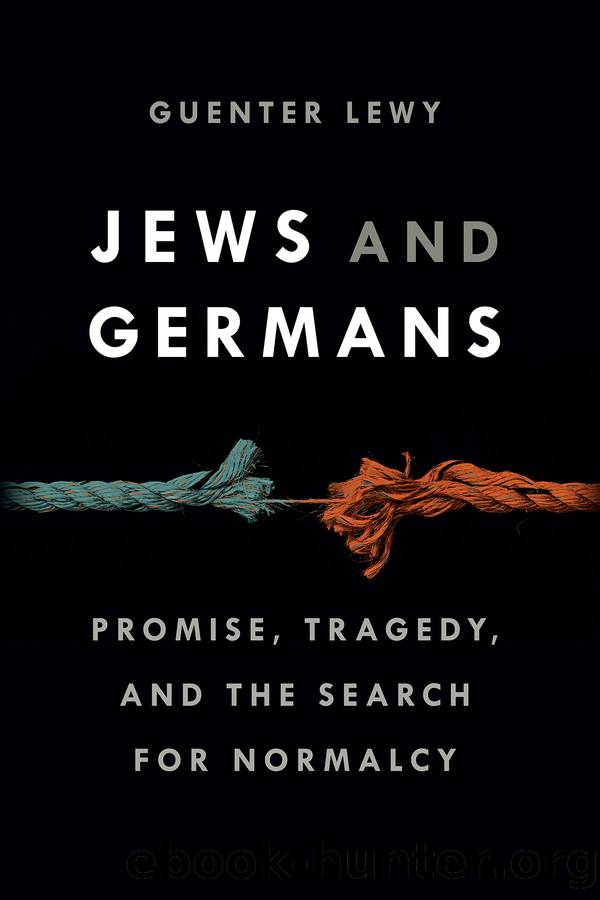Jews and Germans by Guenter Lewy

Author:Guenter Lewy [Lewy, Guenter]
Language: eng
Format: epub
Tags: SOC049000 Social Science / Jewish Studies, HIS014000 History / Europe / Germany, HIS022000 History / Jewish
Publisher: University of Nebraska Press
New Critical Attitudes toward Israel
The desire of most Germans to forget the horrors of the Nazi regime coincided with a new willingness to criticize the State of Israel. In Germany, as elsewhere, the Six-Day War of 1967 and the Yom Kippur War of 1973 had been seen as the successful struggle of the Jewish David vanquishing the Arab Goliath. But, after Israelâs invasion of Lebanon in 1982, the widespread solidarity with Israel and concern for the Jewish stateâs survival weakened. The radical left accused Israel of being a new Fascist Herrenvolk (master race)âthe vocabulary resembling both Soviet and Arab propaganda that labeled Israel a Nazi state that should be destroyed. Jürgen Möllemann, a member of the Bundestag (German parliament) and deputy chairman of the liberal Free Democratic party (FDP), voiced his sympathy for Palestinian suicide bombers, who, he argued in 2002, were acting in self-defense against the occupation of their country.32 He also mailed anti-Semitic fliers to would-be voters. Möllemann had to resign his party post, and, on June 5, 2003, as the Bundestag was about to lift his parliamentary immunity, he committed suicide.33
The mainstream media used less incendiary wording, but for the most part were also strongly critical of the Jewish state. They singled out Israel, the only democracy in the Middle East, without ever criticizing the autocratic Arab statesâsuch double standards revealing that more than anti-Zionism was at stake. Within German Jewry, too, some voices questioned uncritical support for Israel. In 1980 the Jewish Group of Frankfurtânewly organized by the historian Dan Diner, the University of Frankfurt education professor Micha Brumlik, and the Jewish Museum of Frankfurt educational programs director Cilly Kugelmannâcalled for building a strong Jewish community in Germany that would include critics of Israeli policy toward the Palestinians. In the same year, a new magazine, Cheshbon (Accounting), initiated by Jewish students in Munich, argued (in the words of editorial board member Micha Brumlik) for the study of the Jewish scriptures and traditions as the foundation of Jewish life in Germany. The issue of Israel was relegated to the sidelines.34
Important politicians, however, remained solidly in Israelâs camp. Chancellor Angela Merkel, for one, paid a three-day visit to Israel in March 2008 to mark the Jewish stateâs sixtieth anniversary. On March 18, in an unprecedented speech to the Knesset (Israeli parliament), Merkel spoke of her resolute support of Israel. On May 17, 2019, the German parliament was the first government in the European Union to condemn the Boycott, Divestment and Sanctions (BDS) movement targeting the State of Israel. The resolution, brought to the Bundestag by Chancellor Merkelâs Christian Democratic Union (CDU) party, as well as by its coalition party, the Social Democratic party (SPD), and the liberal Free Democrats (FDP) and the Greens, read as follows:
The arguments and methods of the BDS movement are anti-Semitic. The campaign calls for a boycott of Israeli artists as well as stickers on Israeli merchandise that deter their purchase, which is reminiscent of the most terrible phase of German history. âDo Not
Download
This site does not store any files on its server. We only index and link to content provided by other sites. Please contact the content providers to delete copyright contents if any and email us, we'll remove relevant links or contents immediately.
| Africa | Americas |
| Arctic & Antarctica | Asia |
| Australia & Oceania | Europe |
| Middle East | Russia |
| United States | World |
| Ancient Civilizations | Military |
| Historical Study & Educational Resources |
The Third Pole by Mark Synnott(690)
Money for Nothing by Thomas Levenson(638)
The Economist (20210109) by calibre(594)
Christian Ethics by Wilkens Steve;(585)
Made in China by Anna Qu(559)
100 Posters That Changed The World by Salter Colin T.;(511)
Reopening Muslim Minds by Mustafa Akyol(502)
The Irish Buddhist by Alicia Turner(495)
Routledge Handbook of Contemporary India by Knut A. Jacobsen(489)
Nonstate Warfare by Stephen Biddle(480)
The Age of Louis XIV: The Story of Civilization by Will Durant(472)
Culture by Terry Eagleton(470)
The Great Pyramid Void Enigma by Scott Creighton(465)
Ideology by Eagleton Terry;(456)
The Shortest History of China by Linda Jaivin(449)
Objects of Vision by Saab A. Joan;(438)
Banaras: CITY OF LIGHT by Diana L. Eck(436)
The Jews of Silence: A Personal Report on Soviet Jewry by Elie Wiesel(434)
Sybille Bedford by Selina Hastings(426)
